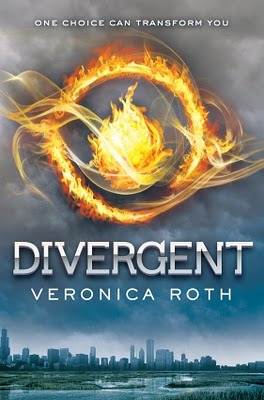Wednesday, March 13, 2013
Divergent by Veronica Roth
Set in the distant future of Chicago, Divergant is a dystopian young adult novel that focuses around the life journey of sixteen-year-old Beatrice Prior and how her one choice drastically shapes her future. The world of Divergent is separated into five factions; Abnegation, Amity, Candor, Dauntless, and Erudite. Each faction formed in the aftermath of a great conflict, and were designed to exclude the traits that they felt were responsible for human conflict and highlight the traits that they hoped would bring peace and balance. Erudite blames ignorance, and choose to pursue knowledge. Dauntless blame cowardice, and choose to highlight bravery. Candor blames dishonesty, and pursue a life of truth. Amity blame hatred and violence, and choose to live in peace and harmony. Finally, Abnegation blame selfishness, and therefor choose to live selfless lifestyles. Once children from each faction turn six-teen, they undergo an assessment test that determines which faction they’re most suited for. They then are left with a daunting choice; to choose their own faction would mean security, and to choose another would mean having to leave their families permanently. Beatrice Porter is born into the Abnegation faction, and though she admires their path towards selflessness, there’s something wild and unkempt in her nature that calls her towards the rowdy Dauntless faction. When the day for her assessment arrives, Beatrice does not what know what to expect—though she does expect answers. Instead, she’s left more confused than ever. She has been told she is a Divergent, and warned never to speak of it to anyone. The rest of the book follows Beatrice’s choice to leave her family and become a Dauntless, as well as the consequences to being a Divergent.
Divergent cleverly addresses a very simple question that most of us have asked or will invariably ask at one point in our lives; what causes evil? In the novel, humans have tried to sort this out for themselves and have naturally come to different conclusions, leading to different factions. Something that both Beatrice and the reader learn however is that no faction is safe from evil, and none have an absolute cure for evil. Evil, like good, is omnipresent. You can anticipate it, guard against it, and fight it—but you can never eliminate it entirely. Beatrice struggles with both the evil present in the world as well as the evils present within herself. In fact, part of what makes Divergent such a good book is that the heroine is not infallible. She does not always do the right thing, even though she was raised to. She doesn’t always do the brave thing, even though she wants to. She isn’t incredibly pretty, or the top student in the class. She excels in some regards and fails in others. She thinks about going home once or twice, and she’s not above crying or screaming. Beatrice is a thoroughly human character, which in tern makes her thoroughly relatable. She also possesses a unique trait—being a Divergent—which makes her journey more interesting. The strength of Divergence as a story is its ability to address human questions in a very human way; through trial and error. Violence is used when necessary, but Roth is never gratuitous or tasteless. She uses enough to get the point across and leaves the rest to the imagination, allowing readers to contemplate their own fears and draw their own conclusions.
With so many dystopian novels being published nowadays, especially in the young adult section, it’s difficult to sort through the failures, the good attempts, and the greats. I think that Divergent easily comes closer to the greats, with its wonderful characters and though provoking concepts. Why does it never quite make greatness, you might ask? Well, this is due to two chief complaints I have about the story. Firstly, I feel as though there should have been an additional character building moment in the story, sometime in between her first and second fight. I wanted to actually see her try to improve herself. I wanted to see her struggle to do so, and maybe find that a life of being reared to be selfless contradicted her feelings for personal improvement. Her character change, and the fact that she was a much better fighter the second time around without much contextual evidence to support how she became so made the transition a little unbelievable. Secondly, the romance aspect of this book was a little disjointed. I really enjoyed how it was progressing at first. The tendency with most YA’s is to just leap into a romantic plot line, usually by using a half-arsed excuse like fate, destiny, or animal attraction. Roth doesn’t do that, instead letting the romance build and gradually unfurl. The problem is, she spends so much time being careful, that by the time it actually does unfurl it unfurls too quickly. I understand why Roth wanted to establish this relationship, as it creates tension for the climax. However, while I like the relationship between the two characters I find myself not really believing it, because I don’t understand why they like each other as much as they do. Neither of these two points change the fact that this is a good book, but they do keep it from becoming a great book. Overall, Divergent is a solid read. The premise and the characters are interesting, and most importantly it will make you think—which is something this nerd thinks that all books should aspire to do.
Subscribe to:
Post Comments (Atom)



That's a nice book
ReplyDelete